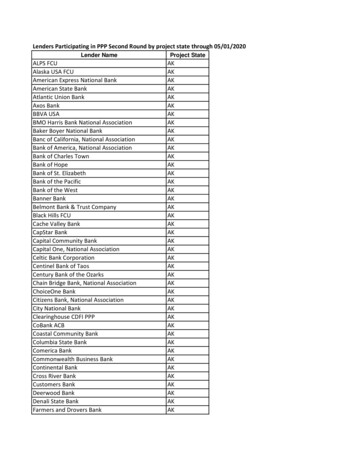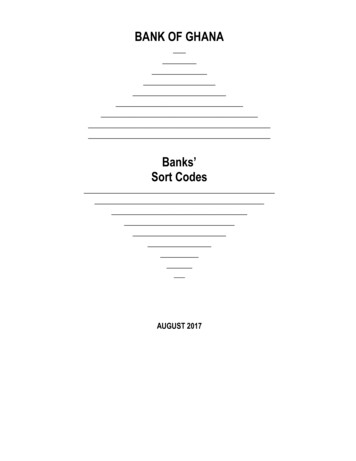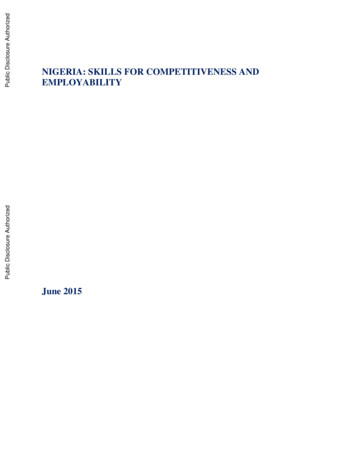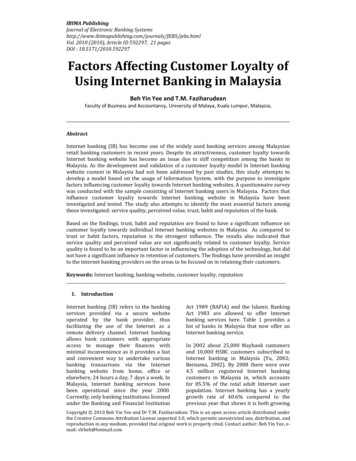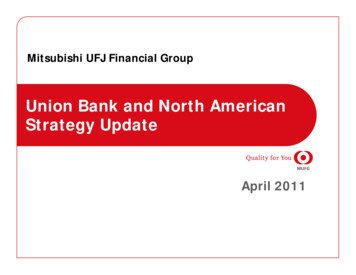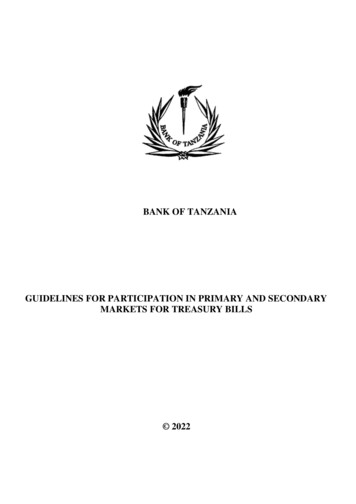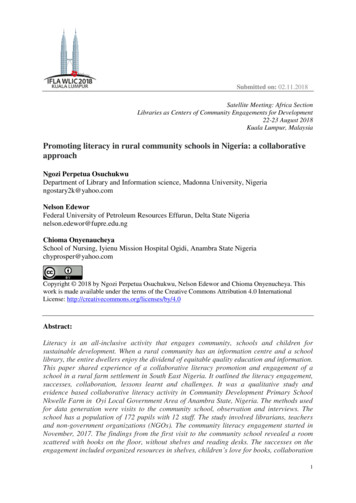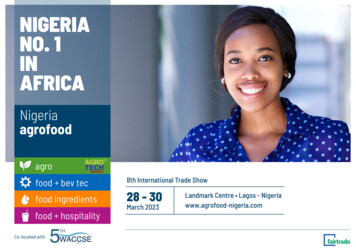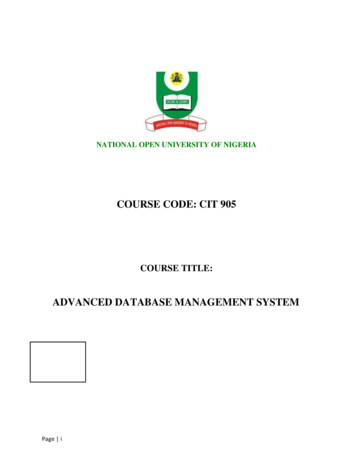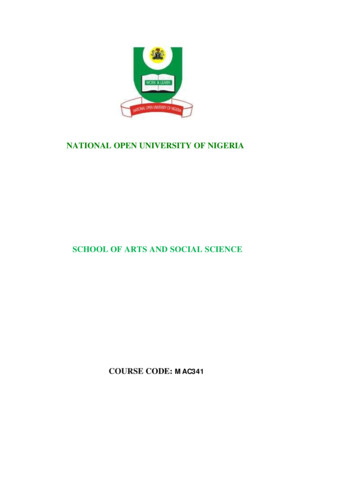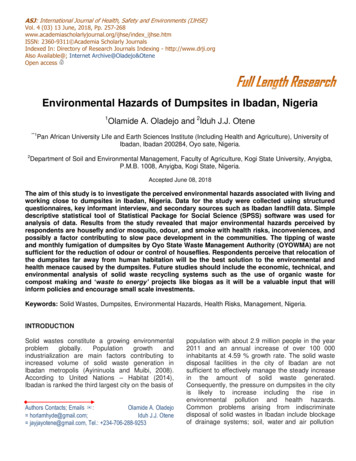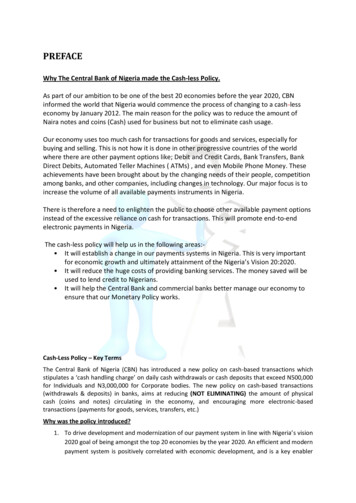
Transcription
PREFACEWhy The Central Bank of Nigeria made the Cash-less Policy.As part of our ambition to be one of the best 20 economies before the year 2020, CBNinformed the world that Nigeria would commence the process of changing to a cash-lesseconomy by January 2012. The main reason for the policy was to reduce the amount ofNaira notes and coins (Cash) used for business but not to eliminate cash usage.Our economy uses too much cash for transactions for goods and services, especially forbuying and selling. This is not how it is done in other progressive countries of the worldwhere there are other payment options like; Debit and Credit Cards, Bank Transfers, BankDirect Debits, Automated Teller Machines ( ATMs) , and even Mobile Phone Money. Theseachievements have been brought about by the changing needs of their people, competitionamong banks, and other companies, including changes in technology. Our major focus is toincrease the volume of all available payments instruments in Nigeria.There is therefore a need to enlighten the public to choose other available payment optionsinstead of the excessive reliance on cash for transactions. This will promote end-to-endelectronic payments in Nigeria.The cash-less policy will help us in the following areas: It will establish a change in our payments systems in Nigeria. This is very importantfor economic growth and ultimately attainment of the Nigeria’s Vision 20:2020. It will reduce the huge costs of providing banking services. The money saved will beused to lend credit to Nigerians. It will help the Central Bank and commercial banks better manage our economy toensure that our Monetary Policy works.Cash-Less Policy – Key TermsThe Central Bank of Nigeria (CBN) has introduced a new policy on cash-based transactions whichstipulates a ‘cash handling charge’ on daily cash withdrawals or cash deposits that exceed N500,000for Individuals and N3,000,000 for Corporate bodies. The new policy on cash-based transactions(withdrawals & deposits) in banks, aims at reducing (NOT ELIMINATING) the amount of physicalcash (coins and notes) circulating in the economy, and encouraging more electronic-basedtransactions (payments for goods, services, transfers, etc.)Why was the policy introduced?1. To drive development and modernization of our payment system in line with Nigeria’s vision2020 goal of being amongst the top 20 economies by the year 2020. An efficient and modernpayment system is positively correlated with economic development, and is a key enabler
for economic growth.2. To reduce the cost of banking services (including cost of credit) and drive financial inclusionby providing more efficient transaction options and greater reach.3. To improve the effectiveness of monetary policy in managing inflation and driving economicgrowth.What are the benefits of the Cash-Less Policy? For Consumers: Increased convenience; more service options; reduced risk of cash-relatedcrimes; cheaper access to (out-of-branch) banking services and access to credit. For Corporations: Faster access to capital; reduced revenue leakage; and reduced cashhandling costs. For Government: Increased tax collections, greater financial inclusion, increased economicdevelopment.Definition of Key Terms“alternative cash payments” includes Point-of-sale (POS) terminals, Mobile payment systems,Internet banking, Multi-functional ATM, Electronic Funds Transfer Systems, and Direct debit“ATM” is an abbreviation for Automated Teller Machine. It is a cash point that can be used towithdraw cash, do Transfers, . A debit card or credit card is used at the machine to withdraw cash.The personal identification number (PIN) has to be entered along with credit or debit card to accesscash. Some ATMs will allow for cash deposits and bill payments.“Bank account” is a record of financial transactions between a bank and the customer which ismaintained by the bank. In addition to financial transactions, a bank account also shows theresultant financial position of the customer with the bank“Card association” is a network of issuing banks and acquiring banks that process payment cards ofa specific brand.“Card holder” is a person who owns the credit card issued by appropriate credit card company orfinancial institution“Card Schemes” define the rules of the card system (e.g. interchanges, licenses, fraudresponsibilities), and choices of technical functionalities (e.g. standards, protocols, securityrequirements)“Cash in Transit (CIT)” Money that is being physically transferred from a business to the bank
“Competent Authorities” include Courts, Economic and Financial Crime Commission (EFCC),Independent Corrupt Practices Commission (ICPC), Regulatory Authorities such as the CBN, NigeriaDeposit Insurance Corporation (NDIC) etc.“Commission on Turnover (COT)” Commission charged to the account holder and calculated on thebasis of the current account turnover“Debit Card” is a card issued by a bank to the account holders so as to enable them to gain access totheir funds in electronic form. Debit cards are used to withdraw cash from ATMs. They are also usedfor electronic transactions like purchases done using Point of Sale (PoS) systems. The customer'saccount is immediately debited or credited.“Deposit taking banks” means banks and other financial institutions that take cash deposits“Electronic Fund Transfer” is a system of money transfer from one account to another within samebank or different banks using electronic mode of transfer without any manual interference“EMV” (Europay, MasterCard and Visa) is the global standard that is helping ensure smart (Chip-andPIN) cards, terminals and other systems to interoperate“financial inclusion” refers to the task of making financial services reach out to the under andunprivileged people of the society at affordable costs and means“Fraudulent card transaction” is one in which the rules and regulations are not properly followed.Generally such transactions are unauthorized by credit card holders and involve a lost, stolen,fabricated, counterfeit and fraudulent processing of a credit card“Hot list” means list of deactivated cards that were reported missing, stolen, lost or damaged by thecard holders“Interconnectivity” means ability for reciprocal exchange of transactions/messages between two ormore switching networks“Interoperability” means ability to issue cards and deploy devices in such a way that all customers(card holders, merchants and issuers) perceive operations, while obtaining service, as if theinterconnected networks were one“Know Your Customer (KYC)” refers to both the activities of customers that financial institutions andother regulated companies must perform to identify their clients, ascertain relevant informationpertinent to doing financial business with them and the bank regulation that governs thoseactivities.“Micro Finance Bank” (MFB) is any company licensed by the Central Bank of Nigeria (CBN) to carryon business of providing microfinance services such as savings, loans, domestic funds transfer, andother financial services that are needed by the economically active poor, micro, small and medium
enterprises to conduct or expand their businesses as defined in the guideline for MFB in Nigeria“Merchant” means an organization or entity that contracts with a Merchant Acquirer for acceptingpayment by means of payment card or any other electronic payment instrument“Merchant Acquirer” means a CBN licensed financial or non-financial institution that has agreementwith the relevant card scheme to contract with merchants to accept payment cards as means ofpayment for goods and services“Mobile Payment System” allows for point-of-sale payments to be made through a mobile device,such as a cellular phone or a smart phone or a personal digital assistant (PDA). Using mobilepayment, a person with a wireless device can transfer money to another person in another city oranother state without needing to go to the bank.“Nigeria Interbank Settlement Systems” (NIBSS) provides the infrastructure for automatedprocessing, settlement of payments and fund transfer instructions between Banks, Discount Housesand Card Companies in Nigeria. NIBSS is owned equally by all licensed banks in Nigeria, and theCentral Bank of Nigeria. Discount Houses operating in Nigeria also hold substantial shares.“Ombudsman” an institution set up to receive and deal with disputes related to banking andfinancial services.“Operations” include facilitation of funds transfer, effecting payment and such other transactionsthat may be determined from time to time by means of an electronic payment instrument“Payment Terminal Services Aggregator” establishes the communication network for reliable POSdata traffic that shall satisfy the service and availability standards and expectations of the industryon a cost effective basis. The role is being fulfilled by NIBSS“Payment Terminal Services Providers” (PTSP) deploy, maintain and provide support for POSterminals in Nigeria. PTSPs shall offer services to acquirers covering all aspects relating to terminalmanagement and support, including but not limited to purchase and replacement of spare parts,provision of connectivity, training, repairs, and development of value- added services“PA-DSS” stands for Payment Application Data Security Standard. PA-DSS compliant applicationshelp merchants and agents mitigate compromises, prevent storage of sensitive cardholder data, andsupport overall compliance with the PCI DSS“PCI DSS” stands for Payment Card Industry Data Security Standard. It was developed by the majorcredit card companies as a guideline to help organizations that process card payments prevent creditcard fraud and various other security vulnerabilities and threats“PCI PED” stands for Payment Card Industry Pin Entry Device. PCI PED security requirements aredesigned to secure personal identification number (PIN)-based transactions globally and apply todevices that accept PIN entry for all PIN based transactions
“PIN” means Personal Identification Number“Point of Sale” Point of Sale refers to the location at which a payment of a card transaction occurs,usually by way of a device such as a credit card terminal or cash register“Processor” processes card transactions“Service Level Agreement” an (SLA) is a part of a service contract where the level of service isformally defined. In practice, the term SLA is sometimes used to refer to the contracted deliverytime (of the service) or performance. Service providers will commonly include service levelagreements within the terms of their contracts with customers to define the level(s) of service beingsold in plain language terms.“Switch” means a system that switches card payments messages between acquirer (or acquirerprocessor) and issuer (or issuer processor)“T 1, T 2, T 3, etc. settlement cycle” is the period of time between the settlement date and thetransaction date that is allotted to the parties of a transaction to satisfy the transaction's obligations.The settlement period is often quoted as T 1, T 2 or T 3; which means the transaction date plusone, two or three days.
Questions1. What is the CBN cash policy?AnswersThe CBN cash policy requires a daily total limit of N500, 000and N3, 000,000 on free cash withdrawals across allaccounts owned by individual and corporate customersrespectively. Individuals and corporate organizations thatmake cash withdrawals above the limits will be charged aservice fee for amounts above the cumulative hermore, 3rd party cheques above N150, 000 shall notbe eligible for payment over the counter with effect fromMarch 30, 2012. Value for such cheques shall be receivedonly through the clearing house.Banks will discontinue cash in transit deposit servicesrendered to merchant-customers with effect from January1, 2012.2. Why is CBN introducing the cashpolicy?What are the benefits of the newpolicy?To increase convenience/access to payment (morepayment options)To enable more transparency in payment systems, andallow for more effective monetary policyTo reduce risk of robberyTo reduce huge cost associated with cash handling(printing, storing, processing, distributing, etc)To enable the achievement of the nation’s vision 2020objective3. Does the cash policy mean there willnot be cash in circulation or peopleare not allowed to use cash?4. When is the cash policy taking effect?No. There will still be cash in circulation. The cash policyaims at reducing the use of cash while increasing the use ofalternative forms of payment.The cash policy started on January 1, 2012 in Lagos as pilot.Phase 2 went live in Abia, Anambra, Rivers, Ogun, Kano andthe FCT on July 1, 2013.Nationwide implementation of the policy will commence in2015.5. Does the cash policy mean bankcustomers won’t have access to theirmoney?Are there any restrictions on theamount of cash customers can pay inor withdraw?As an account holder can I withdrawmore than N150,000 over thecounter?No! The cash policy allows you to withdraw/deposit anyamount of money from/to your account. However, if awithdrawal of cash is done above the daily free total limit ofN500, 000 and N3 million across all accounts owned byIndividuals and corporate organizations respectively, youwill be charged a service fee only on amounts above thecumulative limits.
porateN3,000,001N500,001WithdrawalService Fee(3% ofN1.00)(5% ofN1.00)The policy does not restrict the amount of cash that anindividual can withdraw. It only says that they will have topay service fees on the excess cash.6. When did the charges begin?The charges on cash withdrawal above the set limit beganon March 30, 2012 in Lagos, October 1, 2013 in Abia,Anambra, Ogun, Rivers, Kano and the F.C.T.7. How much will I be charged when Iwithdraw cash above the limit?8. Will the charges be applied pertransaction, daily or monthly?9. If I withdraw N550,000 which isabove the limit how will I be charged?10. Who owns the processing fee? CBNor banks?11. Can 3rd party cheques still be cashedover the counter?12. Can I issue multiple cheques of150,000 each on the same day andnot breach the policy.You will be charged 3% of the amount withdrawn as anindividual or 5% as a corporate organization over the limit.Charges will be applied daily, since it requires the total dailyamounts above the limit.You will be charged the processing fee on N50,000.00 ONLY13. Will a signatory to a corporateaccount be allowed to withdraw overN3,000,000 on the corporate accountsince he is one person?14. Can I withdraw more than once butnot exceeding N 500,000 each?15. Are we going to be reported fordepositing or withdrawing more thanN500,000?16. What are the alternatives to cashpayments?The Processing fee goes to the CBN and Banks.3rd party cheques greater than N150,000 can no longer becashed over the counter.No. The limit is on daily cumulative cash withdrawal ANDNOT per withdrawal. So, if the cheques are going to belodged into an account, it is allowed; but if the cheques arefor over the counter withdrawals you would have breachedthe policy.If a representative and signatory to a corporate accountpresents a cheque on behalf of his company, it isconsidered a corporate withdrawal and he can cash up toN3,000,000 cumulatively on that account.Yes, you can withdraw more than once and NOT breach thepolicy provided your total withdrawals per day do notexceed N500,000There will be no reports on individuals or corporates thatexceed the limits. It is not illegal to exceed the limits; youwill only be charged a processing fee on amountdeposited/withdrawn exceeding the limit.Any of the under listed channels can be used for electronictransactions instead of cash;Point-of-sale (POS) terminalsMobile payment systemInternet bankingMulti-functional ATM
Questions17. How do I begin to use any of thealternative payment channels?18. Must I use all the alternative paymentchannels?19. How do I get a POS as a merchant andwhat does it cost me to have it?Is there any charge on the amountspent by a customer in my shop?AnswersElectronic Funds Transfer SystemsDirect debit for regular in nature bills paymentYou can go to your bank and make enquiry on any of thechannels, you will be guided accordingly.The CBN has also licensed mobile payment operators to rollout mobile payments.You can use any one that suits your needYou can equally use more than one or all depending onyour needs, but you are not forced to use all.Your bank will give you a POS terminal on request (mostlikely free of charge depending on your transactionvolumes).You will only be paying 1.25% of the transaction (amountspent by customer) subject to a maximum of N2000 pertransaction.20. What is the cost of POS?21. Why should a merchant pay 1.25% oftransaction fee subject to a maximumof N2000? Why is it not free?TransactionMerchant Service Commission (1.25%Amountof Transaction Amount)N159,000.00N1,987.50 N160,000N2,000.00The industry has endorsed four manufacturers for thesupply of Point-of-Sale terminals - PAX, Bitel, Ingenico, andVerifone - with negotiated discounts and local supportarrangements. A POS can be purchased from any of thesefour for as low as N45,000.00 per terminal. However,parties are free to purchase POS terminals from anymanufacturer; so far they meet the POS specifications inthe Point-of-Sale guidelines.The fee is distributed to different parties for playingdifferent roles in ensuring the POS system works well.The fee enable the parties to recover the cost of the POS,the cost for support, maintenance, connectivity of the POSsystem, amongst othersPartiesTypical Share of 1.25% (%) **Switch5Processor7.5Acquirer32.5Terminal Owner25Issuer30**The share of 1.25% will depend on the network channelthe PoS is connected through e.g. Interswitch, Visa,MasterCard e.t.cWhen you don’t use the POS, you are exposed to servicecharges hidden in cash transactions you do. These chargescan be in excess of the 1.25% service charge.Merchants should also recognise that there are other ways
QuestionsAnswersin which the POS terminal can benefit them – they can sellother services and earn a commission. For example, mobilecredit can be sold through the terminals; or collect billpayments (e.g. PHCN bills).22. Will customer or cardholder becharged 1.25% for using POS?The 1.25% transaction fee will be paid by the merchant.Customers will only pay the price of the commodity orservice.23. How will using an alternative channelbenefit me?24.25.26.27.28.29.The main benefit is convenience and safety - It saves youfrom robbery, theft, cost of cash management, stress ofcounting cash, looking for change, getting more customersthat do not have cash but card, access to more revenuefrom value added services of POS such as bills payment andairtime vending, etcHow soon will my account be credited Your account as a merchant that accept payments throughwhen people pay with card?POS will be credited on T 1. This means that amount fortoday’s transactions (“T”) will be credited into your accountthe next working day (i.e. Today 1 day)How fast are the POS be deployed?PoS terminals are deployed based on demand and need byvarious banks. If you are interested in obtaining a POS,please talk to your Bank for details and timelines.Who trains a merchant to know howTraining will be provided by the acquirer’s paymentto use a POS?terminal service provider (PTSP). Part of the deploymentprocess is to ensure a practical training of how to use thePOS for the merchant and their staff.If a POS or mobile phone is stolenNo. The money is safe as the devices do not hold thedoes it mean that money storedmoney. The money is stored in the user’s account in a bank.electronically on such devices hasThe person that stole the device cannot use them to accessalso been stolen?your account since they don’t have your PIN number andother information.What is the plan to create awareness Stakeholders interactive engagement is on-goingof the cash policy?Grass root sensitization is also going on at different levels inNigeriaMass media campaign has commenced and will beintensified.More than half of the NigerianEven though a large number of Nigerians are not literate,population are not literate. How willthere is a high level of numeracy as many Nigerians can usethey use e-payments?mobile phones, and engage in functions like recharging, PINentry and SMS. These functions are all what is required todo mobile payments. In addition, biometrics is being usedin some ATMs and POS; this will help in user identificationand ease usage. It is important to note that literacy isdifferent from numeracy; Nigerians are quite numerateespecially when currency is involved; and what is requiredfor these electronic systems is numeracy.30. How prepared are we in terms ofIn terms of infrastructure, CBN is working with The Nigeria
QuestionsAnswersinfrastructures that will supportelectronic payments such as network,power, etc.?Communication Commission (NCC) and telecom serviceproviders to ensure that there are dedicatedcommunication links for the POS system. All POS’s musthave a minimum of 2 SIM slots. Although this does notguarantee 100% connectivity but it increases the uptime ofthe POS system. In terms of power, newly issued POS comewith a minimum of 24 hours battery life. The POS terminalsalso come with car chargers. Infrastructure in Nigeria is notperfect but we are being creative and constantly workingaround the constraints.31. There are risks involved in using theThe ATM fraud was prevalent when Nigeria was usingalternative channels. e.g. ATM fraud. magnetic stripe cards. In Nigeria all cards have adopted theWhat is CBN doing to address cardChip and PIN technology which is more secured and hasfraud?succeeded in reducing the fraud level by 99%. With Chipand PIN, the chances of fraud are reduced; provided youkeep your PIN secret. The Nigeria electronic Fraud Forum(NeFF) an industry anti-fraud initiative comprising banks,EFCC, NIMC, Interswitch, Valucard, CPC, PCC and manyothers deliberate monthly to make our e-payments moresecured.32. What is CBN doing about manyThe CBN has stipulated 72 hours for responding to ATMunresolved issues with the banks oncomplaints by banks, failing which the customer canATM card fraud or dispense errorsescalate to the CBN.that drag for too long?The CBN is also trying to establish a card arbitration panelthat will act as a payments system ombudsman to fast trackresolution of disputes.We should also note that card fraud particularly at the ATMhave reduced drastically with the migration of cards toadopt the chip PIN technology.33. A situation where armed bandits getThe industry has set daily limits to value and volume ofon a bus and force passengers to give transactions; this reduces the exposure in occurrences liketheir ATM cards and pins. How do you this. Also, Banks have a number of short codes which canprevent such?be used to deactivate your card from doing transactions inthe event of theft. Ensure you inquire from your Bank onthese services.34. What of situations where you don’tknow who transferred funds into yourbank account.Customers are advised to always monitor their accountactivities, as a matter of good account management ethic.Always collect your receipts for transactions; have alerts onyour account, review yours statements, etc.35. How do you resolve a POS transactiondispute where customer’s accountwas debited and the merchant hasnot received alert or receipt for thattransaction? Will the merchantrelease the goods or will thecustomer go without the goods?Neither the customer nor the merchant will lose his moneyor goods. Procedures for handling such disputes have beenestablished by banks. The merchant can call his bank to findout the status of the transaction. Based on the responsefrom his bank, he can release goods or customer will get areversal of the debit in his account.
Questions36. What is CBN doing on enhancing thelaws such as evidence Act to supportelectronic payments?37. Some retailers experience peoplespending small amounts, e.g. N100but these add up to about N3m N5m daily. These retailers havemultiple outlets across the nation buthave one corporate account, e.g. MrBiggs. Is CBN going to exempt themfor deposit or remove limit on cashdeposit?38. How will casual labourers atconstruction sites be paid?39. Some traders buy perishable goodsfrom deep inside the bush, fromdifferent people in small quantitiesuntil they load a trailer. The ruraldwellers that sell the perishablegoods to them would not want toaccept e-payments and the servicecharge for cash transaction is high.How will they cope?Buying a cow in Lagos cost more thanN150, 000 and if you mention epayment to the sellers they will thinkyou want to dupe them. How do youaddress that?40. The formal sector finds it easy toaccept the new policy. How about theinformal sector? For example peoplethat collect money in the car parks.Will this policy not increaseunemployment? Also what is beingdone to sensitize people who cannotread or write?AnswersThe Payments System Management Bill and FinancialSystem Ombudsman Bill are before the National Assemblyfor enactmentA new Evidence Act has also been passed in June 2011.We are reviewing this to ensure how various stakeholderneeds can be addressed, while still ensuring the objectiveof the policy is achieved. Some retailers are looking atproviding incentives to their customers to pay electronically(just like airlines who give discount on tickets that are paidfor online) in order to encourage them to use mobilepayments (or other electronic means) for these microamounts.Casual labourers can be encouraged to open up accountsthrough Mobile Money agents where their wages can betransferred electronically leveraging on the mobile moneyplatform. The casual workers can also have access to debitor prepaid cards from their banks to access their money24/7, also ATMs are equipped to allow cash-out for userson the mobile money platform.CBN is equally doing grassroots awareness campaign and itwill reach the rural dwellers/cattle rearers, in order toencourage them to avail themselves of the electronicoptions. We have already seen successes in theintroduction of electronic systems in the agricultural sectorthrough the acclaimed electronic wallet system used indistributing fertilizers to farmers.Market sensitization has been taking place in areas such asAlaba and Ojuwoye market. The grassroots are also beingeducated on the policy and it will continue intensively. CBNis also working with relevant stakeholders to ensure thatmarkets that have not been covered yet are not left out.The new policy does not require high levels of literacy. Theexperience from use of phones will be translated tosystems such as mobile banking. In terms of employment, itis not set to cut jobs but will increase them, the adoption ofelectronic channels will create job opportunities in theservice sectors that will be deepened through the need for
Questions41. How do you take a POS terminal toareas which have used it before and ithas failed?Answersmerchants to train and ensure proper use of POS systemsand other related jobs. POS systems can also be used to sellrecharge cards.The Payment Terminal Service Providers (independentcompanies) were licensed to maintain/support POS.PSTPs have been mandated to ensure that deployed POSterminals are functional at all times. Appropriatemechanism has also been put in place to remotely detectfailures which shall be rectified or replaced within 48 hours.The PTSPs will ensure the POS is working and conduct themerchant through the process by doing test transactions.This will be done in order to restore confidence especiallyin places where unpleasant experiences have occurred.42. What is CBN doing about regulatingcommission? Banks still deduct COTin addition to the commission.CBN is currently reviewing the guide to banking charges, toensure an open and transparent view of the variousbanking charges. It is also important to note that somebanks apart from already offering ZERO COT accounts arealso reducing charges on electronic transactions.43. Merchants do not get value from POStransactions into their account onT 1, If a VISA or MasterCard issuedoutside Nigeria is used. Is the T 1settlement cycle going to apply onVisa and MasterCard?44. What is NIBSS Instant Payment?T 1 only applies to cards issued in Nigeria. For card issuedoutside Nigeria, the settlement cycle should be about T 3at most. CBN is reviewing this settlement cycle with thevarious key stakeholders to see how it can be aligned in linewith the local settlement framework.45. Cash-In-Transit operations- What willhappen to them? Are they going toclose shop?NIBSS Instant Payment (NIP) enables people to transferfunds immediately between two accounts within the samebank or to different banks. This is currently being offered bymost Nigerian banks.No. they will still be relevant. The cash policy means “lesscash” not “no cash”. The amount of cash in the system willjust reduce.46. What is CBN doing to address theissue of only one card e.g. VISA isaccepted in a shop while others likeMasterCard are not?CBN has already issued a circular to break exclusivity ofcard acceptance. Within Nigeria, all cards will now beaccepted at any terminal. There will be no more “onlyMasterCard or VISA accepted here”; every POS terminal willaccept any of the cards issued in Nigeria.47. Will the Cash Policy devalue the Nairain anyway?No. we are presently spending more money printing anddestroying notes. It will bring efficiencies to bear on ourpayment system in future and will impact positively on thevalue of pour currency.PTSPs/NIBSS monitor uptime and usage of all the POS, sothey can checkmate why transactions are not being doneon the POSIt is possible to put incentives for shop attendants by giving48. How do you address the issue wherea shop
Questions Answers 1. What is the CBN cash policy? The CBN cash policy requires a daily total limit of N500, 000 and N3, 000,000 on fre e cash withdrawals across all accounts owned by individual and corporate customers respectively . Individuals and corporate organizations that make cash withdrawals above the limits will be charged a
